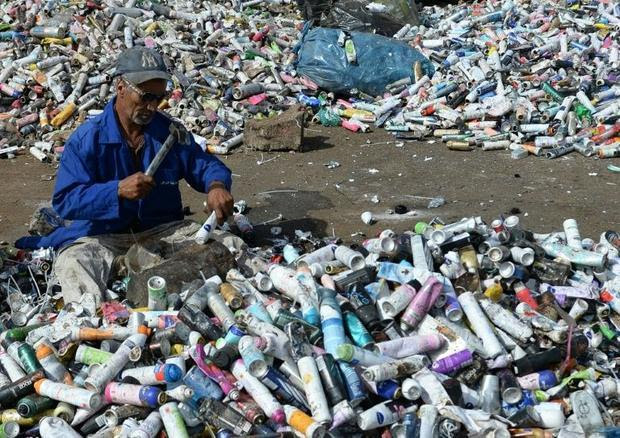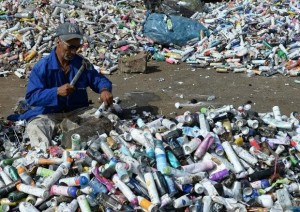AFP
http://www.digitaljournal.com
Pulling carts piled high with plastic bottles or rummaging through unofficial dumpsites, informal trash collectors abound on the streets of Morocco.
Dubbed “Mikhala” in the local Arabic dialect, the thousands of rubbish pickers are often looked down on as they trudge through the capital Rabat and other Moroccan cities.
But a project to hire the Mikhala to work officially is starting to change that image, and even help as Morocco looks to reach an ambitious goal of reducing greenhouse gas emissions by 13 percent by 2020.
In their own modest way, the waste pickers could be a model for countries where, like in Morocco, consumers often do not sort through and recycle their own rubbish.
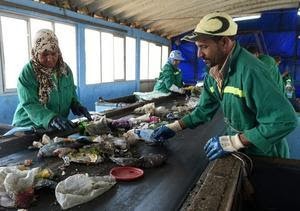
(Moroccan labourers sort waste at the Attawafoq cooperative at Oum Azza industrial landfill in Ain Aouda Fadel Senna, AFP)
As the host of next year’s UN climate conference — following the COP21 meeting in Paris Nov 30 to Dec 11 that aims to conclude a universal climate-rescue pact — Morocco will be under scrutiny for its own efforts to reduce emissions.
And tackling household waste — which the environment ministry says causes up to 18 percent of greenhouse gas emissions in Morocco — will be key.
Unlike in many Western countries where recycling is long established, in Morocco there is little legal framework for waste sorting.
Morocco only recycles about eight percent of its municipal waste, but has targeted to increase the amount to 20 percent by 2020, according to a report presented at the European Union last year.
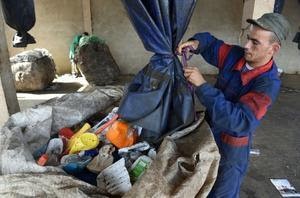
(Morocco only recycles about 8% of its municipal waste, but has targeted to increase the amount to 20% by 2020, according to a report presented at the EU last year Fadel Senna, AFP)
“Informal waste processing is generally done by poor social groups with a low level of education as a daily means of survival,” says Mustapha Azaaitraoui, a researcher specialised in environmental issues.
Set up in 2011 with support from the World Bank, the Attawafoq cooperative at the Oum Azza industrial landfill south of Rabat is a first attempt at changing that.
It employs about 150 people — mainly ex-pickers — to sort trash for recycling on-site instead of on the streets.
– ‘Respect’ for pickers –
Among them is Yassin Mazout, 31, a history graduate who heads the cooperative after becoming a trash picker to pay for his studies when his father died.
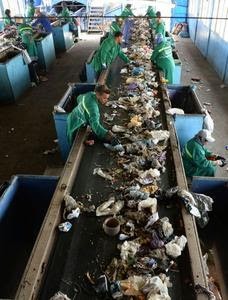
(The Attawafoq cooperative at the Oum Azza industrial landfill south of Rabat employs about 150 people — mainly ex-pickers — to sort trash for recycling on-site instead of on the streets Fadel Senna, AFP)
“We are all equal, we all have the same monthly salary of 2,500 dirhams (about 230 euros/$260),” he says. “Before, at the old dumpsite, the strong would crush the weak.”
After working outside for years, Mazout and his colleagues now work under a roof manually sorting through half of the average 2,000 tonnes of solid waste that arrive each day at the landfill.
“We’re much better off,” agrees Najat, who before joining Attawafoq spent 18 of her 51 years as an informal trash picker.
“We have social security and our earnings help us support our families.”
This year for the first time the cooperative made a profit that will be divided up between members and used to increase its capital.
Mazout wants trash pickers to finally receive the “respect” they deserve as “they play an important role in our lives — both environmentally and economically.”
“The workers are very well organised,” says Gerard Prenant, director of the Pizzorno Environment group that operates and has invested 650,000 euros in the landfill.
“They’re very professional in sorting and we’re delighted to have them working at our site,” he says.
At the landfill outside the capital, Attawafoq’s workers are giving back value to waste.
The cooperative provides an important environmental service at zero cost to the community, Mazout says.
Recycling not only reduces waste in landfills, but also helps to lower greenhouse gas emissions by saving energy from producing or importing products like cardboard and plastic.
Mazout says he hopes the project will inspire others around a country that still counts 220 unauthorised dumpsites.
Morocco aims to close all these informal dumping grounds by 2020, environment ministry official Lubna al-Abed says, and has already funded 16 waste sorting centres like Attawafoq in partnership with municipalities.




